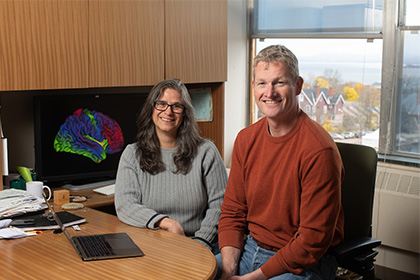Researchers at the University of Vermont recently received a $5.5 million, five-year grant to participate in the Phase II portion of the HEALthy Brain and Child Development (HBCD) Study, an initiative focused on gathering data on brain development from birth through early childhood.

Associate Professor of Psychiatry Alexandra Potter, Ph.D. (left), and Professor of Psychiatry Hugh Garavan, Ph.D. (Photo: David Seaver)
Vermont’s smallest citizens will provide insight into brain development during the first few years of life and help determine what factors influence a young person’s life trajectory. Researchers at the University of Vermont recently received a $5.5 million, five-year grant to participate in the Phase II portion of the HEALthy Brain and Child Development (HBCD) Study, an initiative focused on gathering data on brain development from birth through early childhood.
UVM is one of only a handful of universities to have received both awards.
The HBCD study complements the landmark Adolescent Brain Cognitive Development (ABCD) Study launched in 2015 – a longitudinal study tracking nearly 12,000 youth from age 10 through to young adulthood using advanced neuroimaging to observe brain development and has many of the same data collection elements as HBCD.
Leading the UVM team are Alexandra Potter, Ph.D., and Hugh Garavan, Ph.D., in the Department of Psychiatry. Both professors are involved in the Consortium Administrative Core for the study and are co-lead investigators on the ABCD study.
The goal of the HBCD study is to provide a template of normative neurodevelopment and help identify factors that influence development, eventually leading to greater risk or resilience for numerous mental health and neurocognitive outcomes. Sites will enroll 7,500 pregnant women in their second trimester and will follow them and their children for up to 10 years, collecting data on pregnancy and fetal development; infant and early childhood structural and functional brain imaging; brain size and physical characteristics; medical history; family history; biological specimens; and social, emotional and cognitive development.
The UVM team aims to recruit 330 women in the second trimester of pregnancy through obstetrics and gynecology practices in Burlington and rural Vermont locations. Currently, sites are finalizing protocols and looking towards recruitment efforts starting in fall 2022.
“This study offers an unprecedented opportunity for UVM and Vermont and has the potential to find the earliest markers for how environmental influences impact health outcomes,” says Potter, who adds that UVM’s state-of-the-art imaging facilities, Vermont’s rural population, and the College of Medicine’s support of rural health care assisted with the team’s success in receiving the grant award.
“We are really excited about the science,” says Garavan. “Hundreds of people have accessed ABCD study data and published research over the past couple of years,” he explains, adding that the data from the HBCD study will provide never-before-seen information about how the outside world impacts the developing brain starting at the prenatal stage.
HBCD is funded by 10 institutes and offices at the National Institutes of Health, and the Helping to End Addiction Long-termSM Initiative, or NIH HEAL InitiativeSM, and is led by the National Institute on Drug Abuse. Phase I of the HBCD Study included an 18-month planning period during which awardees considered the experimental design and feasibility of approaches.